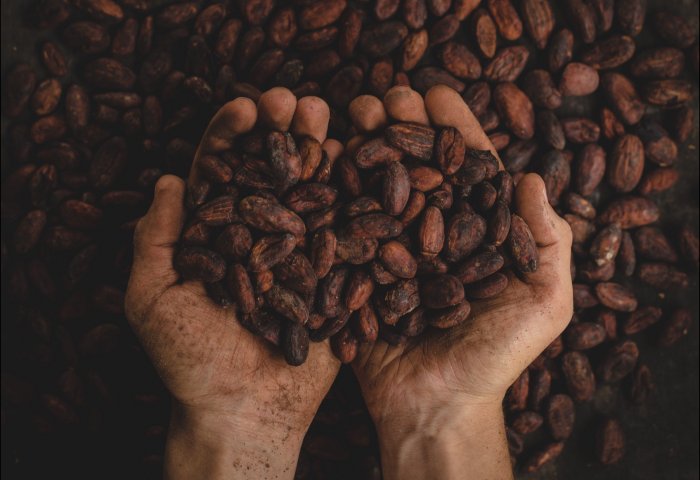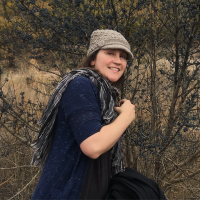In the desert
I saw a creature, naked, bestial,
Who, squatting upon the ground,
Held his heart in his hands,
And ate of it.
I said, “Is it good, friend?”
“It is bitter—bitter,” he answered;
“But I like it
Because it is bitter,
And because it is my heart.”
~ Stephen Crane
~
We silently take our seats in the circle, and the meeting of hungry souls convenes.
Soft lights twinkle from the corners of the white-walled room, the faint scent of copal hanging in the air. The setting sun glows through the whitewashed antique windows of the historic brick building. Gray wool blankets pad the floor beneath our legs and feet.
It’s been months since the world shut down, separating us from neighbors, community, and the connective joy of shared entertainment. This opening is long awaited. No masks, no sanitizers, no fear.
Cups are passed from hand to hand around the circle. An oily, brown residue clings to the insides of white-speckled pottery as the dark liquid waves and settles.
Cacao. Theobroma, melted chocolate in water, transforms into a thick and muddy-rich concoction with ceremonial intention.
As the crystal bowl in the center of the room sings a tone poem in every shade of green, lips to rim, we drink in the brew. A sip, and a slight cringe at the bitterness. Another and another. Eyes open slightly and peek into the cup, wondering how much is left to drink.
Cacao is traditional plant medicine, born from the coursing blood of the Amazon and imbibed for millennia in a sacred Mesoamerican ceremony. It is not a treat. Chocolate, known for its sugary sweetness, in this form goes down bitter. A bitterness that surprises the tongue and puckers the cheeks.
But a surprise: the energy it leaves behind is sweet.
Faintly sweet, an aftertaste that lingers on the tongue with a surprising, unexpected softness. What’s more, a sweetness even more subtle begins to bubble up from within—a calm and reassuring effervescence of loving life force.
It’s a paradox of constricted opening. The dry-mouth bitterness of cacao expands our hearts physiologically, as it opens wide the circulatory highways that pulse the lifeblood throughout our bodies. Spiritually, it relaxes our awareness into a more expansive receptivity to…whatever is.
What first appears to be one thing, becomes something else. Bitter becomes sweet. Opposites overlap themselves in our experience of cacao—like they do in life.
After sitting in the silence of pounding rhythms, of stretched skin drums, we end the ceremony with a prayer to Ixcacao, Mayan deity of chocolate. We pray to the four directions, to the divine feminine and divine masculine, to Mother Earth and Father Sky, Grandfather Sun and Grandmother Moon.
The prayer ends: “We thank you. We honor you. We say goodbye.”
“We say ‘goodbye’?” That’s surprising.
This is a year of loss. Loss of freedom. Loss of health. Loss of security. Loss of certainty. Loss of lifetimes of cascading claims of innocence.
Loss of life.
We struggle, fear, and grasp. We fight, close our wings, look down at our feet while trying to make new plans. We suffer for the not knowing of it all.
But as is our nature, we also count blessings. Stories of neighbors helping neighbors. Relief at being given a chance to finally breathe. The merry-go-round stops just long enough to prove what it is possible when does. In righteous anger, with renewed faith, we extricate fragments of light from the crumbling remains of “normal.”
The narrative of this year is duality. On one hand, there is pain. On the other, opportunity.
Like the Mayans, who understood that both light and dark are needed for life—for anything—to exist, we intuitively understand that pain does not manifest without opportunity. Bitter does not manifest without sweet.
The Mayans did not see light and dark as good and evil. There is no biblical judgment, no casting out of the underworld, in their cosmology. There is only the question, what grows where?
Maize reaches toward the sun. Cacao thrives in the shadows. Both sun and moon give life. Light and darkness are but different kinds of medicine.
We feel the truth of this in our bones. We drink in the stark bitterness of life, for something in our soul knows there is sweetness at the bottom of the cup. This is not an untethered, naive hope. It’s a deep-rooted knowing of the way things are.
This is why we extract the blessings from times of pain. We twist our painful reality until the juice of joyful recognition oozes through our fingers. We are creatures of duality, born into a dualistic world. We are spirit and soul, light and dark, and one half cannot survive without the other.
It is another kind of survival instinct, perhaps, to reject what is bitter in life. To spit it out. To stir honey into the cacao before drinking, to sweeten the taste.
But the duality inside us knows that this will solve nothing.
We are made to desire the sweet. The sweetness of life enlivens us, captivates us, and beckons us toward the full expression of our love. But we are also made to walk upon the rocky bitterness of Earth, to learn its lessons and grow in discrimination. If we are to attain the fruits of our desires, we must struggle up through the tangled roots of dark experience and get our stockings snagged along the way.
Adjusting ourselves away from bitterness does not bring us sweetness. It only stops us from climbing.
Perhaps it runs counter to our mind’s modern programming, but our heart knows that it’s by leaning into bitterness that we merge into sweetness. The blackest, most fertile soil is the remains of centuries of bitter decomposition. The seedbed of life is death.
We think that when we find a little bit of sweetness in our lives, we must hold on to it, keep it close at all times. For if we don’t anchor it tightly to our chest, life may cruelly snatch it away from us when we’re not looking.
But the very nature of sweetness is that it does not stay. It comes and goes, and there is nothing cruel about it. Sweetness, like sugar, is made to dissolve.
We know this by experience. The more we try to hold what is sweet, the more we become fearful to lose it. And fear is the death of sweetness.
On the other hand, if we can resist hoarding the sweetness in our lives, and instead simply love it as it kisses our cheek and runs off into the bushes, our hands and hearts can stay open to receive more. Our eyes can open wider to the beauty around us, and suddenly we are free. Freedom is spirit’s constant gift to the open-hearted.
Sweetness comes from letting go. And letting go is bitter. That is the bittersweet nature of life.
In losing our freedom to move about, we learn to adore our freedom. In losing someone we love, we learn to see our most mundane moments together as excruciatingly beautiful. In losing our security, we come to appreciate the caress of a single soft blanket, warm from the dryer, as though it were woven of pure sunlight by the gods themselves.
Even this lovely and lively old building, itself the remnants of an old pharmacy, with crumbling brick and glossy-sealed concrete floor, is a repurposed loss.
Once there was love and vibrancy here, customers bustling about with prescriptions and purchases and neighborhood chatter. Then there were padlocked doors, dust falling on old furniture, and the quiet passage of time. Outside the walls passed the death of ancestors and birth of new generations. And now the space opens again, to drums and singing bowls and the sweet shadow signature of cacao in ceremony. What first appears to be one thing becomes something else. The cycle continues.
We thank you. We honor you. We say goodbye.
The circle closes, and we place our empty cups in the wicker basket by the altar at the center of the room. We fold our blankets and stack them inside the wooden chest in the corner. The twinkling lights hold the space behind us, as we carry our open hearts into the expectant evening.
Bittersweet. The word contains all the pain and promise of life. In the phonetic English language, often disconnected from the roots of its meanings, so many concepts are difficult to describe. But we are gifted with this word, one that comes complete with a self-contained, dualistic meaning, a two-headed arrow of contradiction that points us toward healing in a contradictory time.
In a bitter year, we can drink in the truth of this word and let its dryness linger on our tongues. We can let it dissolve within and awaken us, as we feel our pulse quicken and our hearts open to what comes next.
We may find some comfort in knowing that the bitterness has already begun to trickle down our throats. We can then become curious about the aftertaste.
What sweetness waits to grow from the fertile soil of these dark days?



Read 15 comments and reply